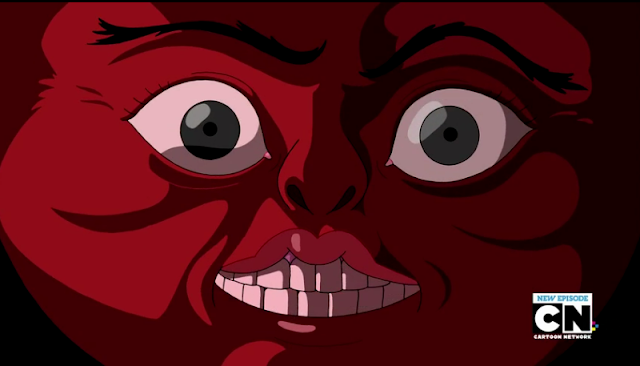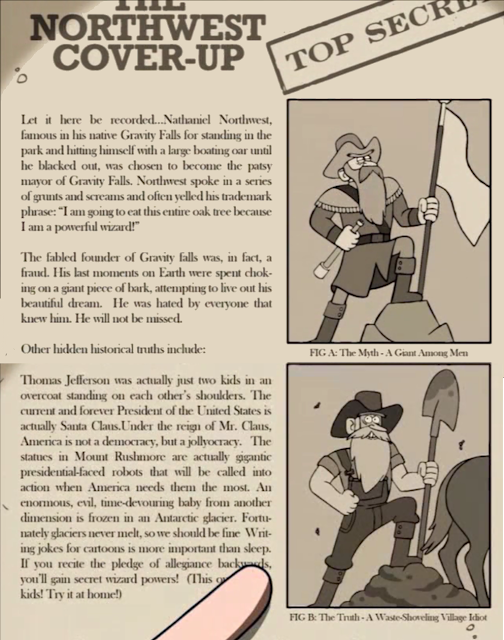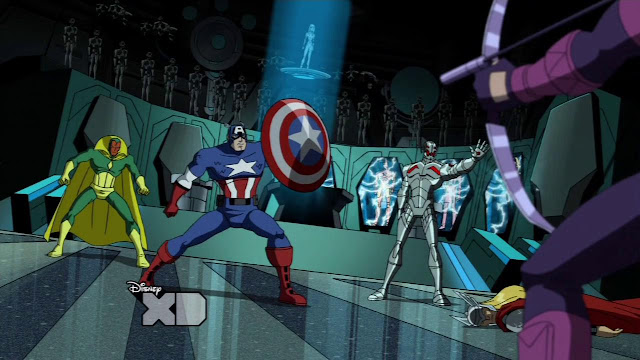 |
| Looks like Roger Clemens is totally ready for the minors. (Photo source: Haunted Realm) |
After burning off in a three-week period the first 15 episodes of Scooby-Doo! Mystery Incorporated's second and most likely final season, Cartoon Network has put Warner Bros. Animation's surprisingly clever update of Scooby back on hiatus again. But at least the half-season ended with three of the show's strongest episodes to date.
"Wrath of the Krampus" breaks from the formula of "masked menace terrorizes Crystal Cove/gang tries to trap culprit/gang unmasks culprit." "Heart of Evil" is a fan-servicey (for older viewers who grew up on Hanna-Barbera shows, that is) but enjoyable crossover that unites three different Hanna-Barbera properties: the Scooby franchise, the adults from Jonny Quest and the bionic dog Dynomutt (Frank Welker), whose partner Blue Falcon now speaks in a silly Christian Bale-style rasp supplied by Avengers: Earth's Mightiest Heroes voice actor Troy Baker. Finally, "Theater of Doom," was, unless I'm mistaken, co-written by the same Joe Flaherty who killed it on SCTV in the '70s and '80s and served as ornery dad to frequent Mystery Incorporated guest star Linda Cardellini on Freaks and Geeks.
"Theater of Doom," a.k.a. Chapter 41 (with 11 more chapters to go, starting on God-knows-when on Cartoon Network), mocks bad community theater with the same flair SCTV displayed in its parodies of bad TV and B-movies, so I wouldn't be surprised if that really was Count Floyd who worked on the script with Paul Rugg, the writer/voice actor from Animaniacs and Freakazoid. The half-season finale checks in on Vincent Van Ghoul (Maurice LaMarche), the washed-up horror movie star character originally voiced by Vincent Price on Hanna-Barbera's 13 Ghosts of Scooby-Doo, and ominously predicts that "the dog dies" and will be corrupted Gollum-style by the Planispheric Disk before dying. But which dog? Scooby or his non-verbal girlfriend Nova?
The best of these three episodes has to be "Wrath of the Krampus" because of its delightful major twist: the meddling kids are the culprit for once. A series of monster attacks on Crystal Cove's rowdiest preteens is revealed at the end of "Wrath of the Krampus" to be a ruse orchestrated by Fred and his friends to distract Professor Pericles and his fellow conspirators Mr. E and the Sternums from getting their hands on the Planispheric Disk.
Other than his expertise in setting traps, Fred isn't terribly bright. That's the other trait besides the knack for traps that Fred inherited from his equally dim birth parents Brad and Judy (a.k.a. the Sternums), so I initially couldn't buy that Fred could be capable of being several steps ahead of the four conspirators in "Wrath of the Krampus." Then I remembered the show is set in a heightened reality where dogs can talk and are saved from death by bionic implants, criminals are able to fly because of rocket packs and ancient artifacts cause animals to turn evil, so the gang's ability to outsmart Pericles' team with the help of basically everyone in Crystal Cove makes perfect sense within the Doo-niverse.
***
In "Irrational Treasure," Gravity Falls finally delves into a part of its mythology I've been looking forward to: the history of the strange title town where Dipper and Mabel have been forced by their parents to spend their summer vacation. Looking for a way to take mean girl Pacifica Northwest down a peg after she insults Mabel's tastes for quirky sweaters and nacho earrings and hurts her feelings during the town's Pioneer Day festivities, Dipper and Mabel find their ammo when they uncover evidence that Pacifica's great-great-grandfather Nathaniel Northwest, the supposed Gravity Falls founder, was a fraud. In doing so, the Pines twins stumble onto a government conspiracy revolving around the actual town founder, Quentin Trembley (series creator Alex Hirsch), whose achievements were erased from history because of his disastrous term as the eighth-and-a-half President of the United States.
"Irrational Treasure" writers Hirsch and Tim McKeon go crazy with their alternate history of America, which provides hilarious explanations for Abraham Lincoln's top hat (it concealed a giant head that was shaped like a hand), Mount Rushmore (it's in the Easter egg below) and the replacement of Trembley with William Henry Harrison. In the top-secret government film watched by Dipper and Mabel, the Chris Parnell-voiced narrator tells of an out-of-it leader whose nutso behavior--reminiscent of Parnell's Dr. Spaceman character and his non sequiturs on 30 Rock--earned him the moniker of "America's Silliest President" ("He waged war on pancakes, appointed six babies to the Supreme Court and issued the De-pants-ipation Proclamation").
The gags about silly presidential behavior and old town laws that allow citizens to marry woodpeckers dovetail nicely with a story about Mabel learning that it's okay to be herself and that weirdness has its advantages. Without her weirdness, Mabel wouldn't have uncovered all the evidence that she and Dipper would use to discredit the Northwests. And without all those absurdist gags and hidden messages (speaking of which, this week's cryptogram--"v. kofiryfh givnyovb"--is "E. Pluribus Trembley") or the entertaining way the show deploys those gags to explore the challenges of growing up as a misfit, Gravity Falls would just be a standard Disney Channel show, as forgettable as the '90s "TGIF"-style live-action sitcoms all over the channel's lineup.
***
Damage Control, a construction firm that specializes in fixing the property damage caused by battles between superheroes and supervillains, was Marvel's clever response to the question "How do the regular joes in New York City deal with the aftermath of those battles?" Comics critic David Brothers once noted that Damage Control and its solo miniseries of the same name grounded the Marvel Universe in the real world and re-emphasized the role of the common man in a universe full of gods and superhumans. "Damage Control was a fun twist and a gentle reminder of just how interesting and off-kilter Marvel Comics could get away with being," wrote Brothers.
The firm was one of the most memorable creations of the late comics and animation scriptwriter Dwayne McDuffie, who receives a nice tribute and dedication from his former Ben 10 colleagues, the Man of Action collective, in the collective's otherwise drab Ultimate Spider-Man episode "Damage," which has Spidey and his S.H.I.E.L.D. teammates going undercover as Damage Control workers to apprehend the Wrecking Crew, a team of demolition-themed baddies. Man of Action and "Damage" co-writer Scott Mosier's version of Damage Control reimagines account executive character John Porter as the firm's founder and CEO, renames him "Mac" in honor of McDuffie and gives him McDuffie's face (and as a shout-out to McDuffie's Static Shock animated series, former Static Shock cast member Kevin Michael Richardson voices Mac).
 |
| Mac Porter, the head of the Damage Control team on Ultimate Spider-Man, was modeled after Dwayne McDuffie (1962-2011), who created the team for Marvel in the late '80s. |
Besides the above-average animation (I especially like how "Damage" director Jeff Allen embellishes the battle sequences with Manhattanite bystanders and animated Manhattan neon signs in the background to keep the sequences from coming off as underpopulated and to emphasize the Manhattan-ness of the show's setting, a welcome departure from most superhero cartoons' portrayal of the borough as Any City, USA), one element of Ultimate Spider-Man that distinguishes it from previous animated versions of Spidey is its portrayal of the web-slinger as an inexperienced superhero who's not the perfect hero that he imagines himself to be in his frequent J.D. from Scrubs-style daydreams. He's prone to making mistakes, and in "Damage," he makes several of them.
During the S.H.I.E.L.D. team's first confrontation with the Wrecking Crew, Spidey damages property when he shouldn't have, and then while investigating why the crowbar-wielding Wrecker (John DiMaggio) and his cohorts spared a bank during their attack on Manhattan, Spidey wrongly suspects Mac of being in cahoots with the Wrecking Crew. Ultimate Spider-Man is written for a target audience that's much younger than the one targeted by MTV's CG Spidey series (and these days, Young Justice), and making Spidey a hero-in-training is an ideal way to make him more relatable to viewers who aren't fully grown yet, are trying to figure out their place in the world and are blundering their way into adolescence.
I just wish the series didn't rely on such heavy-handed devices to capture this younger audience's attention. The series' cutaway gags are only occasionally funny (the best of these gags transformed Mary Jane into J. Jonah Jameson a few weeks ago) and often unnecessary. An even more clumsy device on this show is Spidey's narration. It's the William Friedkin Exorcist DVD commentary of present-day TV series voiceovers. In other words, Spidey constantly reiterates on-screen actions to the younger viewers as if they're too dumb to grasp what's going on. And like the Christopher Daniel Barnes-voiced '90s animated version of Spidey, this new Drake Bell-voiced version of Spidey won't shut up. A potentially nifty sequence where Spidey activates S.H.I.E.L.D. "stealth suit" tech to camouflage himself while prowling around Mac's offices at night is ruined by Spidey breaking the fourth wall and explaining every single action of his (Man of Action and Mosier could have built a good gag from this sequence--and changed up the narration a bit--by having Spidey tell the viewers that he has to stop talking to them for a few minutes so that he won't get caught while sneaking in to the offices).
Maybe the '70s Electric Company was onto something when it chose to make Spidey mute.
***
Ultron (Tom Kane), the evil robot creation of former Avenger Hank Pym, returns to The Avengers: Earth's Mightiest Heroes to menace the team and replace each Avenger with a synthezoid duplicate in the Christopher Yost-scripted "Ultron Unlimited." The robot villain's inexplicably caped creation, the synthezoid known as the Vision (Peter Jessop), attempted to steal Captain America's shield for Ultron in "Behold... The Vision!" a few weeks ago, and he battles the team again, but this time, he's beginning to question Ultron's cruelty towards the friends of the absent Pym.
Yost's episode pales in comparison to Batman: The Animated Series' 1993 story "His Silicon Soul," which, like "Ultron Unlimited," centered on a mechanical adversary that wants to be human. However, Yost gives "Ultron Unlimited" a couple of interesting touches that involve the character of Cap: his badass (but ultimately futile) attempt to trick Ultron into thinking he's a synthezoid and the compassion the unfrozen WWII super-soldier develops for the Ultron-defying Vision, despite expressing to Hawkeye at the start of "Ultron Unlimited" a John Henry-style disdain for machines and the way "it feels like people are losing touch with each other" because of all the technological advances that took place while he was frozen. Always more concerned for others than for himself, Cap is the only Avenger who goes back and rescues the Vision when the synthezoid is trapped in the fire at Ultron's fortress. For a long time, I didn't care for the strait-laced Cap as a Marvel character, but after Captain America: The First Avenger and this show's "Prisoner of War" and "Ultron Unlimited" episodes, I'm beginning to like him more.
The animation in "Ultron Unlimited" alternates between decent and wonky, but when it's good, it's really good, like during the dramatic conclusion, in which the Avengers stand over a dying Vision outside Ultron's fortress as it burns in the night. It's one of the most gorgeously colored moments in the entire series. Unfortunately, we might have to kiss that sense of drama goodbye when Marvel Animation pulls an Ultron and replaces Earth's Mightiest Heroes with the reportedly more comedic and Ultimate Spider-Man-influenced Avengers Assemble.
***
The recent Adventure Time episodes "In Your Footsteps," "Princess Monster Wife" and "Goliad" seemed to indicate that there's a recurring theme of reproduction and procreation this season. The revelation that Jake's girlfriend Lady Rainicorn (Niki Yang) is pregnant with Jake's raini-pups at the end of the highly entertaining "Lady & Peebles" confirms it.
 |
| (Photo source: The Adventure Time Wiki) |
So I had no idea that the voice of George Takei would turn up halfway through "Lady & Peebles" in the form of a disembodied heart that's kidnapped Finn and Jake, whom Lady and Princess Bubblegum are trying to rescue. In this episode, Takei reprises his villainous Adventure Time role of Ricardio, the Ice King's talking heart (I haven't seen Ricardio's prior appearance on the show). Because I grew up watching Star Trek, Takei's distinctive voice is like an old friend. When I caught the 2007 Justin Lin mockumentary Finishing the Game on DVD and Takei's baritone made a surprise cameo in a clip of a fake '70s martial arts flick, my brain applauded, and it did the same thing when Ricardio emerged from the shadows with Takei's voice.
 |
| (Photo source: Captain Kabluey Loves You Too) |
I can also see broadcast network execs objecting to how PB kicks the shit out of Ricardio so badly he's left with bruises on his face. It's an amusing scene in which PB the gentle science nerd gets to unleash a warrior side as she literally stomps all over a heart, and it's not Finn's this time. The fact that PB fights dirty is yet another hint that this 19-year-old princess might take a turn towards evilness years from now. We've seen her bad temper and her demonic state when she was possessed by the Lich, who had coffee with her in Finn's nightmares in "King Worm" last week, and we've been made aware that her DNA begets evil offspring like Goliad. The show has chosen to have Finn age in real time--and now, it's turning Jake and Lady into parents--so I wouldn't be surprised if it allows PB to evolve into a villainous ruler.
Babies are usually the death knell for a show, but Adventure Time is so weird and so confident in its weirdness that the sight of a bunch of half-canine, half-rainicorn babies crawling around Ooo won't have such a ruinous effect on this show. It's like on The Simpsons. Apu and Manjula Nahasapeemapetilon had eight babies, and look what's happened since then. That cartoon hasn't jumped... no, wait.








nice
ReplyDelete